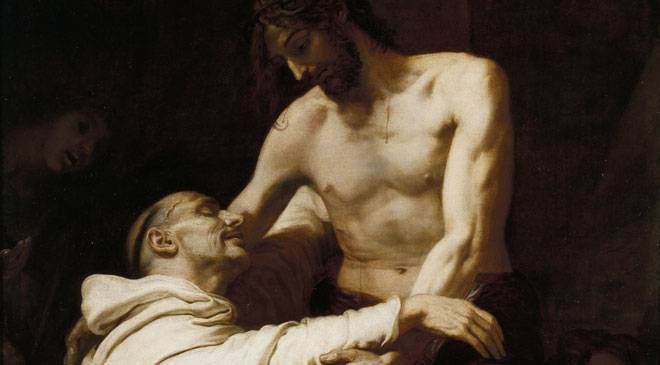
11 Oct Reflections on Loving Love
St Bernard of Clairvaux speaks of Love itself as the thing we love most. He means that when we love, it is for Love’s own sake that we do it: that I love in order to love, as he says, and so without any other reason, with no other cause or effect, but simply because it is only by loving that I can inhabit Love, which is where I most of all love to be.
For St Bernard, then, the deepest thing is not that I love this or that, as if particular things were the ground of my loving them. Rather, according to Bernard, loving is its own ground, whereas particular things are the gifts and the opportunities through which Love is enabled to express itself. In loving them, I love the Love itself which loves them, and which alone discloses them to me as loveable.
This last point is of the upmost importance. Love, St Bernard tells us, is the result of love. He means that Love is alone what enables love, that it is Love itself from which love unfolds, and hence that Love alone is able to know the things that give themselves to be loved. It follows that, if we are to love at all, we have always to love first and in advance – for only in that way, only in the adventure of beginning to show love, can anything at all open itself to us as loveable.
And this is true, even of Love itself. In other words, we cannot know what Bernard tells us, we cannot see that Love itself is indeed the thing we love, without first venturing to love. Only then, in the midst of loving this or that, will Love reveal itself as, of all things, the most loveable.
Except, of course, that Love isn’t a thing, one among others, not even the most important of them. Love gives itself to be loved above all things, and therefore precisely not as the best of them, as a uniquely loveable object. Instead, Love is more adequately thought of as a form of life, a way of living, a participation in a pattern of relation to things. As Christians we believe that this pattern is originally and ultimately Divine. Love, we believe, is the life of the Trinity: the life which, as Love and because it is Love, stands as the origin and end of all things. And we believe that this life of Love has been revealed, expounded and communicated to us in the Paschal Mystery.
From all this, we are enabled to entertain the following thought. What St Bernard identifies as the heart of Love, which is to love Love itself, is the same thing as to love God Who is Love. The primacy of Love itself, in everything and everyone that we love, finds its ground and completion in loving the Father through Christ in the Holy Spirit.
And I think that this is correct. What remains is to trace the path which leads from loving this or that to loving God. We can attempt this, in a very preliminary way, in three stages, drawing on St Bernard as we go.
First of all, we have seen that Love means loving first: before, and therefore beyond, the possibility of being loved in return. Love means loving unconditionally, and therefore sacrificially. It means, as St Bernard puts it, that we are willing to practise a love which is self-sufficient because it refuses to measure itself according to what it receives back. In that sense – according to Bernard – Love is its own payment and its own reward. This is what it means to love, when Love itself is what we love.
Secondly, I think Bernard wants to claim that every lover in some way apprehends this logic, this unconditional, sacrificial sufficiency, but does so only fitfully, confusedly, and perhaps even despairingly, because left to ourselves we are quite incapable of enacting it. It is for this reason that our loves simultaneously inspire and rebuke us, hinting at a radicalism, an absolution from every kind of calculative self-interest, from which, nonetheless, we inescapably defect. We find that we can never love enough, that something always impedes our loving, above all, to love.
But thirdly, and very beautifully, Bernard describes what alone can make us pass over from defection to fidelity. Love, he tells us, must return to its beginning, consult its origin and flow back to its source; it must always draw from that endless stream. This means finding God, which of course also and more fundamentally means God finding us. And this reconciliation and reunion happens in Christ, in the Bridegroom who is Himself Love, as St Bernard call Him. For in contesting and undoing all the obscurities of sin, Christ recalls and clarifies the Love that is the Alpha and Omega of our world.
In Christ, then, we see what it looks like to love Love above all things. But we do not merely see it, we come to share in it. For Love, as Bernard tells us, produces Love, so that, in being loved by God, we come to love as God Himself loves. And this is what loving God means: loving God means loving like God, loving all things as God loves them. It means that Divine Love finds new instances in us, as our loves become purified of everything that falls short of Love itself.
By Fr Philip Cleevely, Cong. Orat.

